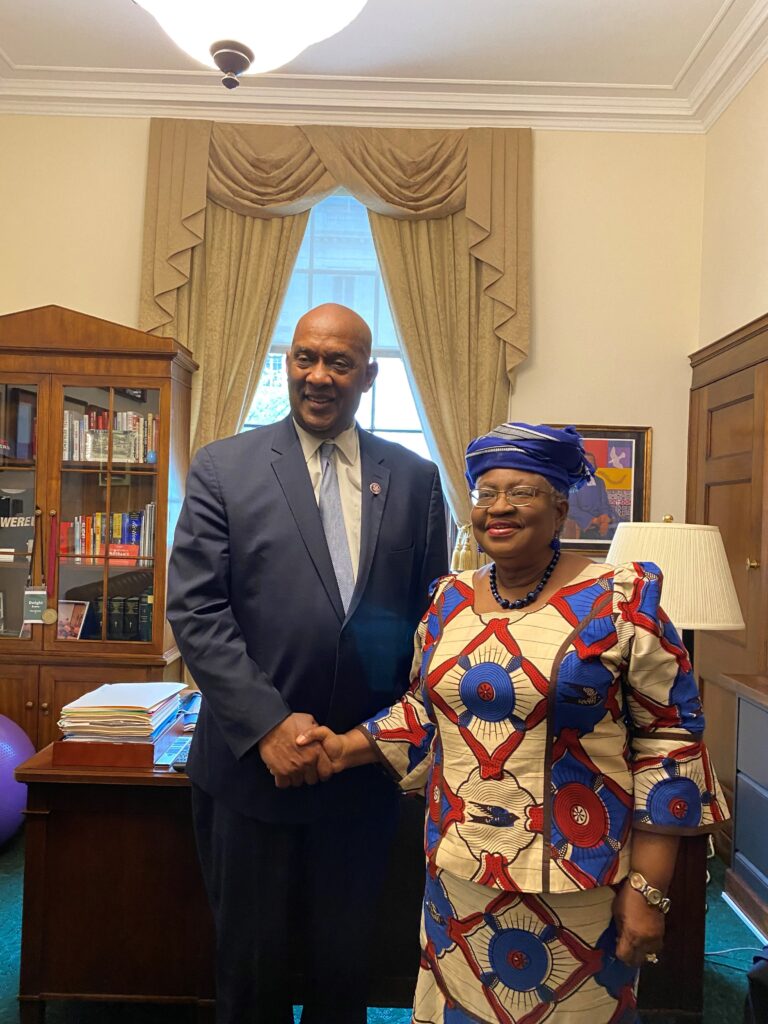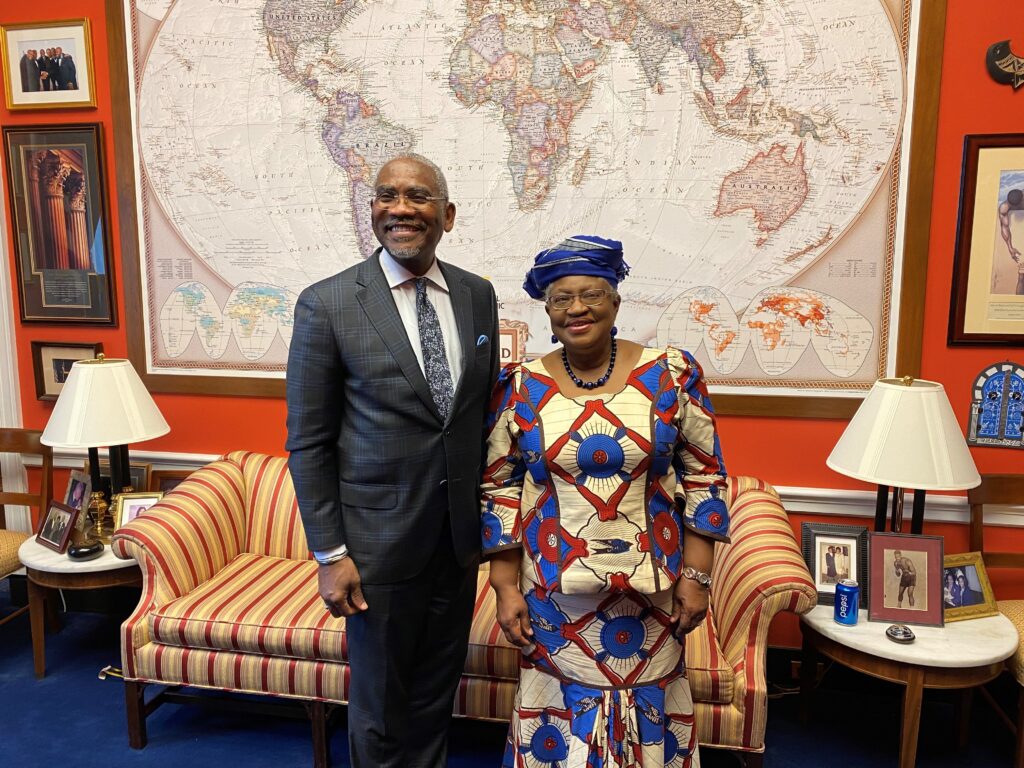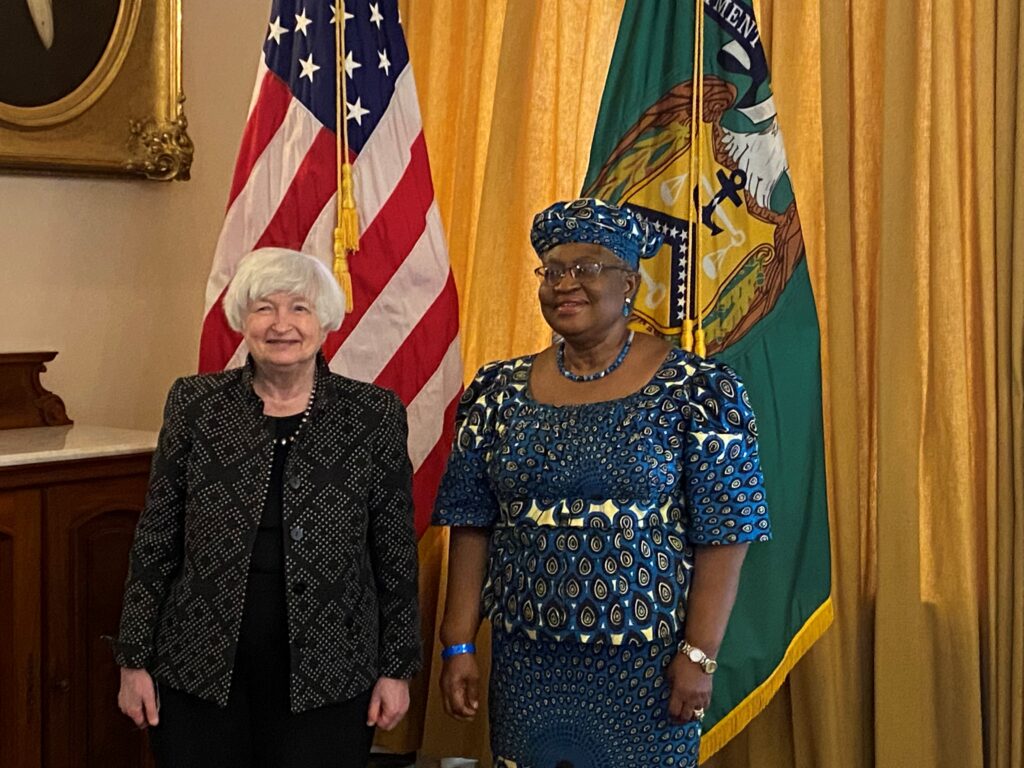


Director-General Ngozi Okonjo-Iweala confers with Congress, Treasury, Agriculture leaders
BMWorldwide–Washington–The meeting with Amb. Katherine Tai wrapped up the Director-General Ngozi Okonzo-Iweala four-day mission to Washington DC. Accompanied by her Deputy Director-General Angela Ellard, Dr Okonjo-Iweala had met with U.S. Treasury Secretary Janet Yellen, the chairs and ranking members of the House Ways and Means and Foreign Affairs Committees as well as the chair and ranking member of the Senate Finance Committee. She also met with members of civil society and the business groups, the Agriculture Coalition for WTO Reform and Women in International Trade. While she was in Washington, she was presented with the National Foreign Trade Council Foundation’s prestigious World Trade Award.
At every occasion, the WTO Director-General stressed the importance of reforming the WTO and reinforcing the multilateral trading system to better meet 21st century challenges like climate change, battling the COVID-19 pandemic and warding off a food crisis brought about by the war in Ukraine. She noted that the multilateral trading system is a global public good which has delivered over time. Retreat from multilateralism into a system of competing and perhaps adversarial trading blocs would diminish the flow of technology, create inefficiencies and shave as much as 5% off global economic growth, she explained. Instead, she said, WTO members should pursue a policy of re-globalization which uses the trading system to bring in those who have been left behind.
The discussion with Ambassador Tai revolved around the US objectives for the 12th Ministerial Conference (MC12) to be held on 12-15 June in Geneva. There was discussion on efforts to gain agreement on the WTO’s response to the COVID-19 pandemic including intellectual property, on disciplines to curb harmful fisheries subsidies and efforts to reform the organization. So-called level playing field issues pertaining to industrial subsidies were also discussed. The Director-General explained to Amb. Tai that while the war in Ukraine had produced challenges in carrying out negotiations, alternative procedures had been implemented, decisions were being taken and it was still possible that MC12 could produce meaningful results.
“We have a challenging few weeks ahead of us and if we are to make progress, US leadership will be essential. Amb. Tai and I had an excellent discussion on the prospects for MC12 and what the United States would like to see in terms of inclusive outcomes that deliver for all,” the Director-General said.
The meeting with Secretary Yellen centred on WTO reform, climate change, the global economy and the disruption to global supply chains brought about by the COVID-19 pandemic and by the war in Ukraine.
In her meeting with US agriculture producers, the Director-General expressed her strong concerns about the impact of the war on trade in food, fertilizer and energy. While Russia and Ukraine combined account for less than 3% of global exports, they supply 25% of global wheat exports, 15% of barley exports and 45% of sunflower product exports. Dr Okonjo-Iweala explained that the closure of trade from the Black Sea could provoke a global food crisis, with countries in Africa and the Middle East most adversely affected. She sought advice from the agricultural groups on how best to ensure adequate supplies of food in the near future.
The issue of supply chain resilience was also on the table and the Director-General stressed that trade had been a crucially important tool in providing medical supplies — including inputs for vaccines — during the height of the pandemic. While it is understandable and prudent for companies to look for ways to diversify their supply chains and reduce dependency on certain types of supplies, she said this objective could not be met without trade.
On Capitol Hill, the Director-General listened to views on WTO reform including reform of the dispute settlement system and discussed how best to move forward on intellectual property issues pertaining to access to vaccines against the COVID-19 pandemic. She underscored her commitment to reform of the WTO and explained how the organization was meeting some of the challenges that have arisen since the outbreak of the war.
DG Okonjo-Iweala stressed that trade and food security has long been a critical issue on the WTO agenda but has now “shot to the top of the global policy agenda” due to the impact of the Ukraine conflict, especially in countries dependent on food exports from Ukraine and Russia. The high-level participation at the seminar was testimony to the importance the international community attaches to this issue, she said.
Russia and Ukraine together account for more than one-quarter of all traded wheat, and around three-quarters of world exports of crude sunflower oil, said the DG. In addition, Russia accounts for nearly one-tenth of fuel exports and, together with Belarus, one-fifth of the world supply of fertilizer.
She emphasized that households in Africa and the Middle East are particularly vulnerable to disruptions in these supplies: “35 countries in Africa import food and 22 import fertilizer from Russia, Ukraine, or both countries.” This could exacerbate the hunger already faced by millions of people around the world. The current spike in food prices comes on top of challenges due to the pandemic, economic downturns, climate-related shocks and conflict, she noted.
DG Okonjo-Iweala underscored the central role that trade can play in addressing food insecurity, including improving availability and access to food, helping to meet demand for more diverse and nutritious food, and improving the predictability and stability of global food markets for producers and consumers. She also highlighted that as a partner of the newly established United Nations Global Crisis Response Group on Food, Energy and Finance, the WTO is supporting the call to keep markets open and avoid unjustified export restrictions.
The DG emphasized that trade negotiators are very conscious of the need to improve food security as they prepare for the upcoming 12th Ministerial Conference, which is due to begin on 12 June.
In the panel discussions, the UN Food and Agriculture Organization (FAO) listed the factors causing food insecurity – such as low productivity and efficiency, climate change and economic slowdown – and mapped the scale and depth of the problem worldwide. FAO data shows that between 720 and 811 million people in the world faced chronic hunger in 2020. It predicted that despite the UN Sustainable Development Goal zero hunger target, “around 660 million people may still face hunger in 2030, including tens of millions linked to possible lasting effects of the pandemic. And this is not yet taking into account the impact of the war in Ukraine.” FAO stressed: “Beyond hunger, nearly one in three people in the world were affected by moderate or severe food insecurity in 2020.”
In the face of unprecedented challenges, FAO suggested several ways to build more resilient agri-food systems, including tackling poverty and inequality, and enhancing humanitarian efforts and peace building in conflict areas. Other organizations participating in this panel included the African Development Bank, the Organisation for Economic Co-operation and Development and the United Nations Conference on Trade and Development.
Several participants highlighted trade’s contribution to addressing hunger, food insecurity and wider nutrition challenges, emphasizing the need for all countries to assess the long-term impact of their policy instruments, such as export restrictions, to “avoid policy responses that can jeopardise food security”.
The UN’s World Food Programme (WFP) shared its concerns over the global repercussions of the Ukraine crisis on the most vulnerable groups. It estimated that 145 million people will need food aid in 2022, 17 million more than in 2021. Soaring food prices and high transportation fees have increased WFP’s operational costs by 44%, it said. WFP highlighted the importance of keeping trade flowing and minimising disruptions to global supply chains, including by removing export restrictions and various taxes and duties on WFP food purchases. It welcomed the joint statement signed by over 80 WTO members pledging not to impose export restrictions on food purchases bound for WFP. It urged more members to support this commitment at the upcoming 12th Ministerial Conference.
Other participants in this panel included the International Grains Council, the Inter-American Institute for Cooperation on Agriculture and the International Food Policy Research Institute.
Several participants stressed the critical importance of market transparency, including through the G20 Agriculture Market Information System which provides current market information, helping to ensure transparency and sound decision-making.
In other discussions, WTO members, representatives from international organizations, think tanks and academic institutions exchanged views and suggested ways to tackle the challenges.
